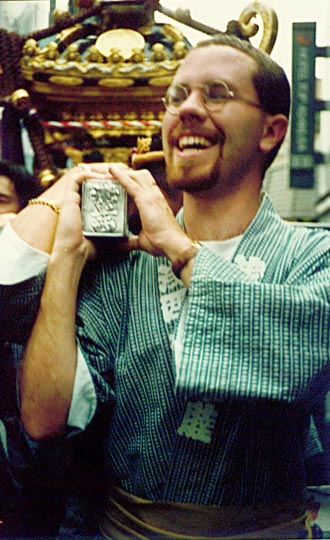May 18: Sanja Festival


It is generally said, and I agree, that the Japanese are not a very religious people. One joke says that 80% of Japanese are Buddhist, while 80% believe in the native Shinto religion. However, generally about 80% of the people can be considered nonbelievers in any serious way. One thing for sure is that less than 5% believe in Christianity (compared to almost half of Koreans-go figure), so many Westerners find themselves reevaluating their religious lives when they encounter Japan for the first time.
At any rate, Japanese people can be characterized as more superstitious than anything else. Many people pay a visit to a local temple or shrine (whichever they prefer) before a big test or during New Years. In most houses one still finds a miniature temple and a shrine that are a part of daily life. The family Buddhist alter is a place to make offerings to deceased relatives, which is actually a custom from Confucianism (more a philosophy than a religion). At any rate, it seems to me that the average Japanese person doesn't put any more weight in these symbols than say an American who goes to church on Easter and Christmas.
However, there are still a number of activities that bring families and neighbors together, so like Christianity, the religions can't really be too bad, eh? The Japanese Shinto religion is based on agricultural roots and so most of the festivals and activities held at the shrines are during the main growing season. Starting in the spring and continuing through the harvest, there are a number of lively festivals held through Japan at many local shrines.
One of these is the Sanja Festival held every May at Asakusa Shrine in Asakusa, Tokyo. This rather traditional area of old Tokyo is very near my house, so I went out to the festival with my host family. The festival doesn't seem to have any special significance other than it is a fun time for people to go out and enjoy the spring weather. Also, contrary to intuition, I heard that these "traditional" festivals are much more popular in modern Tokyo than they are in the countryside. Anyway, here is a description of the basic activities.

There are many smaller Shinto shrines around Asakusa that all own a portable shrine. It is like an altar that is said to contain spirits and whatnot. These portable shrines are rather heavy, so they only go out once in a while. One of these times is during the Sanja Festival. Patrons of each shrine get together and carry their portable shrine over to the neighboring shrine. It is all rather fun.
My host father generally spends a day or two of the three-day festival carrying shrines. However, because his mother passed away last year, he is not supposed to visit any shrines or see any of the gods for a year. He seems to really enjoy this activity because it also includes a lot of sitting around and drinking with the guys inbetween runs with the shrine.
In the past women were not allowed to carry any shrines, but recently there are women members of these clubs. However, if you don't live in the area, generally you are out of luck. This means that most foreigners only get to take pictures while other people enjoy the fun. I was lucky (?) enough to get to help carry one shrine for a bit. It was interesting. Rather heavy.
Otherwise the festival is kind of like a little carnival. There are lots of little tents set up around the shrine with people selling lots of greasy Japanese carnival food. Some favorites are snow cones, Japanese pancakes, fried octopus, cotton candy, chocolate covered bananas, etc. These tents show up at almost any event in Japan and are very popular despite rather high prices.
In general there really isn't really a lot going on at the festival. Just a lot of people pushing other people in order to see something that is not so exciting to see. Many people dress up in special short-style kimonos and so the festival definitely has a different atmosphere, but not much else. I ran into some people from NTT that were making a home page of info about the shrine, adjacent temple, and the festival. They took a picture (below) of my sister and I and put it on their home page. Sometimes it seems like nothing in Japan really has much meaning. Anyway...
